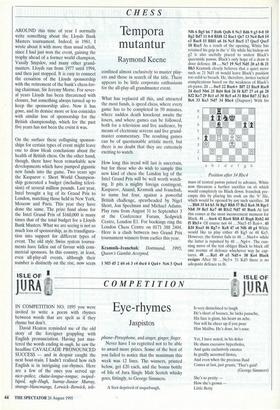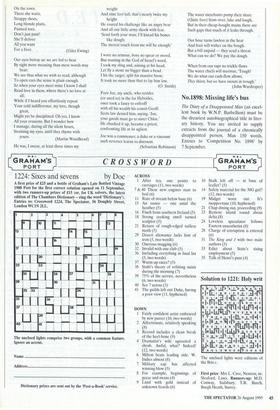is,,,, VIII ,11,4 11141 ' ' a
JURA
,,,,t 4411SCUICH NNW
COMPETITION
Eye-rhymes
Jaspistos
IN COMPETITION NO. 1895 you were invited to write a poem with rhymes between words that are spelt as if they rhyme but don't.
David Heaton reminded me of the old story of the foreigner grappling with English pronunciation. Having just mas- tered the words ending in ough, he saw the headline CAVALCADE PRONOUNCED SUCCESS — and in despair caught the next boat-train. I hadn't realised how rich English is in intriguing ear-rhymes. Here are a few of the ones you served up: nice–police, chaise-longue–tongue, swiped– biped, ugh–Hugh, hurray–Junior Murray, strange–blancmange, Lerwick–Berwick, tele- phone–Persephone, and singer, ginger, finger.
Never have I so regretted not to be able to award more prizes. Some of the best of you failed to notice that the maximum this week was 12 lines. The winners, printed below, get £20 each, and the bonus bottle of Isle of Jura Single Malt Scotch whisky goes, fittingly, to George Simmers.
A Scot deprived of usquebaugh,
Is very disinclined to laugh.
He's short of bounce, he lacks panache, His face is glum, his heart an ache. Nor will he cheer up if you pour Him Malibu. He's dour, he's sour.
Yet, I have noted, in his doles He shuns excessive hyperboles, And quite exclusively emotes In gruffly accented litotes, And even when the precious fluid Comes at last, just grunts, 'That's guid'.
(George Simmers) She's so pretty — How she's grown — Little Betty
On the town. There she waits, Strappy shoes, Long blonde plaits, Painted toes. Don't just pant!
She'll deliver All you want For a fiver. (Giles Ewing) Our eyes betray us: we are led to hear By sight more meaning than mere words may bear; We see thus what we wish to read, although To open ears the sense is plain enough. So when your eyes meet mine I know I shall Read love in them, where there's no love at all; While if I heard you effortlessly repeat Your cold indifference, my love, though great, Might yet be disciplined. Oh yes, I know All your evasions. But I wonder how I manage, during all the silent hours, Straining my eyes, until they rhyme with yours. (Martin Woodhead) He was, I swear, at least three times my weight And nine feet tall; that's nearly twice my height.
He roared his challenge like an angry bear And all our little army shook with fear. 'Send forth your man; I'll knead his bones like dough; The merest touch from me will be enough.'
I wore no armour, bore no spear or sword, But trusting in the God of Israel's word, I took my sling and, aiming at his head, Let fly a stone no bigger than a bead.
I hit the target, split his massive brow; It took no more than that to lay him low.
(0. Smith) Poor Joe, my uncle, who resides (or used to) in the far Hebrides, once took a fancy to enfeoff with all his wealth his cousin Geoff. Scots law denied him, saying, 'Joe, your goods must go to sister Chloe.' He chucked it up, became a priest, confronting life at its ugliest.
Joe was a commoner; a duke or a viscount such reverses learns to discount.
(Sebastian Robinson) The water merchants pump their share (Quite free) from river, lake and lough, But in their cheap-bought mains there are Such gaps that much of it leaks through.
Our hose turns lawless in the heat And fruit will wither on the bough. But a bill unpaid — they send a threat. What can we do? We pay the dough.
When from our taps no trickle flows The water chiefs will murmur, 'Tough!
We do what our cash-flow allows.
They thirst, but we have snouts in trough.'
(John Wardroper)
No.1898: Missing life's bus The Diary of a Disappointed Man (an excel- lent book by W.N.P. Barbellion) must be the dreariest autobiographical title in liter- ary history. You are invited to supply extracts from the journal of a chronically disappointed person. Max 150 words. Entries to 'Competition No. 1898' by 7 September.



















































 Previous page
Previous page